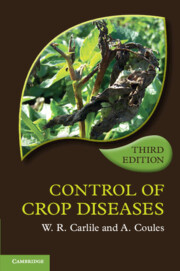Book contents
- Frontmatter
- Contents
- Preface to the third edition
- Preface to the second edition
- Preface to the first edition
- Trademarks and registered trademarks
- 1 Introduction
- 2 Major crop diseases in the UK
- 3 Diagnosis of disease in crops
- 4 Eradication, Certification and Legislation
- 5 Crop husbandry and cultural practices
- 6 Production and use of crop cultivars resistant to disease
- 7 Fungicides and Biological Control
- 8 Current Trends and Future Prospects
- Bibliography and further reading
- Index
- Plate Section
8 - Current Trends and Future Prospects
Published online by Cambridge University Press: 05 May 2012
- Frontmatter
- Contents
- Preface to the third edition
- Preface to the second edition
- Preface to the first edition
- Trademarks and registered trademarks
- 1 Introduction
- 2 Major crop diseases in the UK
- 3 Diagnosis of disease in crops
- 4 Eradication, Certification and Legislation
- 5 Crop husbandry and cultural practices
- 6 Production and use of crop cultivars resistant to disease
- 7 Fungicides and Biological Control
- 8 Current Trends and Future Prospects
- Bibliography and further reading
- Index
- Plate Section
Summary
Introduction
Plant breeding coupled with advances in crop protection technology has resulted in major increases in yield and improvements in the quality of many crops. Consistent improvements in crop yield and quality have taken place in the agricultural systems of member states of the European Union, where for many years financial incentives were provided to farmers to encourage self-sufficiency, particularly in cereals and oilseeds. Indeed some 70% of the total EU budget has been disbursed in the past to farmers and growers in the form of price support. Under such systems productivity greatly increased. For example, cereal production in the UK rose from 59% of total needs in 1971 to 103% in 1981, and by the early years of the twenty-first century the UK had developed a considerable export trade, with about 25% of the wheat crop being exported.
This intensification of production is reflected by substantial improvements in per hectare yields of all types of cereals (Fig. 8.1), and involved the growth of high-yielding cultivars, promoted by the use of substantial amounts of nitrogenous fertilisers, plant growth regulators to prevent lodging (2.2.2), and protection by applications of herbicides and fungicides. Such high-input growing systems led to the supply of some foodstuffs, notably grain, exceeding demand, resulting in accumulation and stockpiling of grain on occasions in some EU member states during the late twentieth century, even with efforts to export grain to non-EU countries. The provision of price support to farmers for the purpose of producing agricultural commodities surplus to the requirements in the EU is now recognised as anomalous, and efforts have been undertaken to redress this imbalance. The reform of the EU’s Common Agricultural Policy in 1992 included the introduction of compulsory set-aside land in most member states. As a consequence, the cereal hectarage of the UK fell by 13% in 1993, with the area of wheat in particular declining from almost 2.1 million ha in 1992 to less than 1.8 million ha in 1993. However, poor grain yields in some years (for example 2005–6), not only in the EU but also in the rest of the world, resulted in reductions of global grain stocks, and this led to a reversal of the policy of set-aside in the EU in 2007.
- Type
- Chapter
- Information
- Control of Crop Diseases , pp. 146 - 165Publisher: Cambridge University PressPrint publication year: 2012

